Gay marriage

Massachusetts’ highest court on Wednesday will consider whether the daily recitation of the Pledge of Allegiance is a violation of students’ rights.
Since the addition of the phrase “under God” in 1954, the pledge has been challenged repeatedly as a violation of the separation of church and state. In 2004, one case reached the Supreme Court, but ultimately failed, as have all previous challenges.
But the current case before the state’s Supreme Judicial Court, Doe v. Acton-Boxborough Regional School District, is different because lawyers for the plaintiffs, an anonymous atheist couple, won’t be arguing about federal law but rather that the compulsory recitation of the pledge violates the state’s equal rights laws. They argue that the daily recitation of the pledge is a violation of their guarantee of equal protection under those laws.
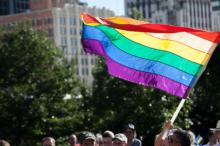
A new voice is emerging in the evangelical community, and it’s turning away from the church’s vocal opposition to homosexuality in favor of a more tolerant attitude.
Researchers at Baylor University found that 24 percent of evangelicals were “ambivalent,” meaning they support civil unions or legal recognition of gay relationships, despite harboring a moral opposition to homosexuality.
“What you have is this increase in people coming out publicly and saying, ‘I don’t want to be a part of this anti-gay rights movement as an evangelical,’” said Lydia Bean, assistant professor of sociology at Baylor and co-author of the study.
The study, “How the Messy Middle Finds a Voice: Evangelicals and Structured Ambivalence towards Gays and Lesbians,” analyzed national data from the 2010 Baylor Religion Survey, conducted by Gallup.
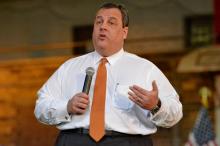
As activists push states to recognize gay marriages, New Jersey Gov. Chris Christie — conservative Republican governor in a blue state and a 2016 presidential possibility — is walking a fine line between two electorates and two elections.
Christie vetoed same-sex marriage legislation last year and severely criticized the Supreme Court’s decision striking down a ban on federal rights for same-sex married couples. At the same time, he is “adamant” that same-sex couples deserve equal legal protection, wants a referendum on gay marriage, and vows to abide by a same-sex marriage law if New Jersey voters approve it.
He’s tiptoeing between constituencies. First are the voters of New Jersey: polls show they favor same-sex marriage, and Christie wants them to re-elect him in November by a big margin.

England and Wales became the 16th and 17th countries in the world to recognize gay marriage after Queen Elizabeth II gave “royal assent” to a same-sex marriage bill.
Under the new law, gay men and women will be able to join together in civil ceremonies or in church services — although no religious denomination will be forced to carry out such services.
Cheers, laughter, and clapping broke out in the House of Commons when Speaker John Bercow announced the bill had been approved.

The legal battle over same-sex marriage has shifted from the Supreme Court to state capitals and lower courts as supporters seek to build on their recent victories and opponents hope to thwart that progress.
Armed with Justice Anthony Kennedy’s decision striking down the Defense of Marriage Act, lawyers representing same-sex couples filed a lawsuit in Pennsylvania on Tuesday, and vowed to follow with others in North Carolina and Virginia.
Those cases will be added to at least 11 pending from New Jersey to Hawaii.
The twin Supreme Court rulings on Wednesday that further opened the door for gay marriage in the U.S. were not entirely unexpected, and the condemnations from religious conservatives angry at the verdicts were certainly no surprise either.
So the real question is what gay marriage opponents will do now.
Here are four possible scenarios that took shape in the wake of Wednesday’s developments:
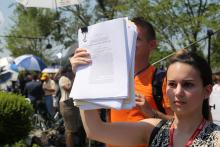
In the Methodist tradition in which I was I raised, there is a concept of perfection. We “strive for perfection” in loving each other and loving God. It is not about avoiding all mistakes. It is about growing in love for neighbor and being hospitable to all we come in contact with. This is the point of our theology: as we grow in faith and love, we become closer to God. In the end, resisting God’s call to love others is pretty hard to do.
And yet we know not everyone we meet is irresistible. We all have moments when some folks are harder to love than others. Sometimes those we find difficult to love are members of our own families. Other times they are friends we’ve had a conflict with. And for some of us, they are hard to love simply because of whom the other person loves.
Sometimes a court opinion is more than just a court opinion.
Justice Anthony Kennedy’s 26-page decision Wednesday striking down a federal ban on same-sex marriages offers a window into Americans’ rapidly shifting views of same-sex relationships — a shift that increasingly relies on matters of law and fairness, not moral or religious views.
At the same time, Justice Antonin Scalia’s biting 26-page dissent in United States v. Windsor reflects a set of cultural, religious, and social arguments that are losing ground in the court of public opinion and now, in the highest court of the land.
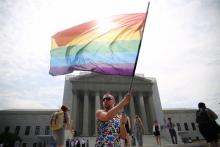
The Supreme Court this morning struck down the Defense of Marriage Act, 5-4, which prohibits the federal government from recognizing same-sex marriages performed in states.
From the opinion:
"DOMA violates basic due process and equal protection principles applicable to the Federal Government. The Constitution’s guarantee of equality 'must at the very least mean that a bare congressional desire to harm a politically unpopular group cannot' justify disparate treatment of that group."
Read the full opinion here.
Following the court's announcement, President Barack Obama Tweeted his support.
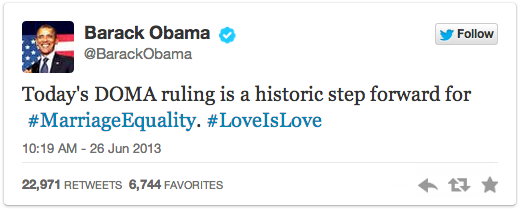
The Washington Post reports:
“The federal statute is invalid,” wrote Anthony Kennedy in his majority opinion, “for no legitimate purpose overcomes the purpose and effect to disparage and to injure those whom the State, by its marriage laws, sought to protect in personhood and dignity.”
Read more here.
Also on Wednesday, in another 5-4 decision, the Court ruled that the appeal to the lower court's decision overturning California's Proposiion 8 — the state ballot measure that ruled that only marriage between a man and a woman would be recognized — had no standing, in effect, allowing same-sex marriage to continue on the state.
Read the opinion here.

This week the U.S. Supreme Court is expected to hand down decisions on two significant cases for same-sex marriage: United States v. Windsor (regarding the Defense of Marriage Act, or DOMA), and Hollingsworth v. Perry (regarding California’s Proposition 8).
At the Supreme Court this morning, an expectant crowd gathered hoping to catch the decisions firsthand. Most in attendance were visibly supportive of same-sex marriage, and many were cautiously optimistic that the Court would strike down DOMA, Proposition 8, or both.
See our slideshow and interviews with those gathered at the Supreme Court, below.

Ryan Anderson has planted himself on arguably the most unpopular stance for his generation: opposing gay marriage.
At 31, Anderson has become one of the leading voices in the
“millennial” generation against the legalization of gay marriage. With the upcoming Supreme Court decisions on gay marriage, his ideas have been circulated in conservative circles, giving him an influence beyond his years.
“Debating marriage is probably not what I would have chosen,” said Anderson, a fellow at the conservative Heritage Foundation in Washington. “It’s the question that most likely gets you kicked out of your law firm.”
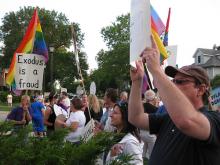
Exodus International, a group that bills itself as “the oldest and largest Christian ministry dealing with faith and homosexuality,” announced late Wednesday that it’s shutting its doors.
Exodus’s board unanimously agreed to close the ministry and begin a separate one, though details about the new ministry were unavailable at the time of the organization’s press release.
The announcement came just after Exodus president Alan Chambers released a statement apologizing to the gay community for many actions, including the organization’s promotion of efforts to change a person’s sexual orientation.

If the range of possible Supreme Court rulings on gay marriage this month requires a scorecard, the potential confusion arising from those decisions may demand a manual.
It’s not as simple as whether gays and lesbians can marry, and whether they become eligible for federal benefits. The two decisions are likely to create new questions for couples in civil unions and those who move between states, as well as for employers.
As a result, what’s already a complex situation for many gay and lesbian couples could get more complicated, at least initially, said John Culhane, a law professor at Widener University’s Delaware campus and co-author of Same-Sex Legal Kit for Dummies.
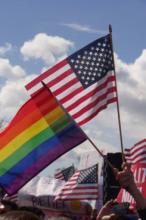
Houston lawyer Mitchell Katine came to the Supreme Court 10 years ago for the final chapter of Lawrence v. Texas, the landmark gay rights case in which the justices struck down state sodomy laws.
Neither Katine nor the other lawyers working for John Lawrence and Tyron Garner in their battle against Texas’ sodomy law imagined the length and breadth of Justice Anthony Kennedy’s majority decision, which struck down all remaining state sodomy laws.
As the Supreme Court prepares to issue two historic decisions on gay marriage this month, however, the judges and lawyers who worked on both sides of those earlier cases don’t expect anything quite so eloquent or all-encompassing from a cautious and conservative court.
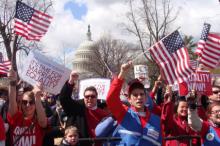
About 72 percent of Americans say legal recognition of same-sex marriage is “inevitable,” according to a survey released Thursday.
Of those who support same-sex marriage, about 85 percent say it is inevitable, says the Pew Research Center’s survey. About 59 percent of opponents also say it is inevitable.
“As more states legalize gay marriage or give equal status, the question in our minds was how the public sees the trajectory on this issue,” said Michael Dimock, the report’s lead author and director of the Pew Research Center for the People and the Press. “Do they see a future in which gay marriage is going to be the rule, not the exception, in American society?”
Bishops in the Church of England, who had strenuously opposed a bid to allow same-sex marriage, signaled that they won’t try to derail the bill after an overwhelming vote of support in the House of Lords.
Church of England spokesman Steve Jenkins said that in the same way the church will eventually allow women bishops, England will eventually allow same-sex marriage.
“It doesn’t mean the Church of England is happy, but that’s where our government is going,” Jenkins said. “Now it’s about safeguarding people’s right to hold religious beliefs.”
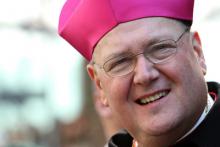
NEW YORK — When Cardinal Timothy Dolan used the morning talk shows on Easter Sunday to say the Catholic Church could do a better job of welcoming gays and lesbians, his remarks were hailed by one activist as an “Easter miracle” and by another as an encouraging “first step.”
But two months later, it’s still not clear what the second step in this fraught process might be, or even if there is a second step. And there are signs that things may only get more complicated.
Since Easter, three more states have passed same-sex marriage laws, and next month the U.S. Supreme Court will hand down a gay marriage ruling that will again spotlight the bishops’ full-throated opposition to a whole host of civil protections for gays and lesbians, particularly marriage.
Moreover, as Americans — and American Catholics — grow increasingly accepting of homosexuality, and as foes of gay rights grow increasingly determined, conflict at the parish level seems inevitable. The uneasy “Don’t Ask/Don’t Tell” policy that once allowed gay and lesbian Catholics to take church positions is clashing with their increasing visibility in the form of marriage licenses or wedding announcements.

WASHINGTON — Rhode Island on May 2 became the 10th state to approve same-sex marriage, and the Delaware Legislature holds a key vote on May 9 on the same issue. But Brian Brown, president of the National Organization for Marriage, denies there is a national tide in support of marriage rights for gay couples.
“I don’t know that I would say Rhode Island is a trend,” Brown said, also questioning victories for supporters of gay marriage initiatives in Maine, Maryland, and Washington state last November.
“Again, we’re talking about states that are not necessarily indicative of the rest of the country. These are pretty deep-blue, liberal states we’re talking about.”
Even so, Brown, the head of the leading national organization opposing same-sex marriage, finds himself playing defense as more Americans support same-sex marriage and more state legislatures debate measures authorizing it.

The story of a Long Island Catholic ousted from his parish jobs for marrying his male partner generated headlines, outrage and an 18,000-signature petition to Bishop William Murphy to have Nicholas Coppola reinstated.
But now the tale has an odd coda: Murphy, who heads the Diocese of Rockville Centre, mailed the petitions back to Coppola with a one-line cover letter on the bishop’s stationery that reads: “FROM YOUR FAITHFUL ROMAN CATHOLIC BISHOP.”
No signature, nothing else.
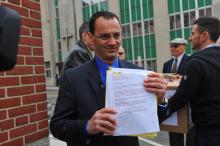
A gay man ousted from posts at his Long Island parish after a critic complained that he had married his partner delivered a petition with more than 18,000 signatures on Thursday to Bishop William Murphy, asking to be reinstated.
“Bishop Murphy, please let Nicholas Coppola resume volunteering at his parish – and make it clear that faithful gay and lesbian Catholics are welcome to participate fully in parish life in your diocese,” reads the petition. Murphy is longtime head of the Roman Catholic Diocese of Rockville Centre.
According to gay activist network GLAAD, which has been assisting Coppola, a security guard at the diocese agreed to deliver the petition but said that neither Murphy nor diocesan officials would meet with Coppola and representatives of the activist groups who accompanied him.